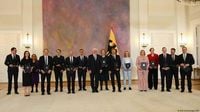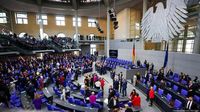In a significant political shift, Germany has witnessed the election of a new Bundestag during early parliamentary elections held in February 2025. The results have led to a complex political landscape, with the right-wing bloc of CDU/CSU failing to secure an absolute majority. This outcome has left the party unable to form a government independently, necessitating a coalition agreement with the Social Democratic Party of Germany (SDPG), which finished in third place.
On March 25, 2025, the first session of the newly elected Bundestag took place, marking a pivotal moment in German politics. President Frank-Walter Steinmeier officially dismissed Federal Chancellor Olaf Scholz and 14 ministers from his government during a ceremony at the Bellevue presidential palace in Berlin. This dismissal aligns with Article 69 of the Basic Law of Germany, which stipulates that the chancellor and ministers cease their duties when a new Bundestag convenes.
Despite their dismissal, Steinmeier requested that Scholz and his cabinet remain in their positions temporarily as acting officials until a new government is formed. This request is also in accordance with legal provisions, allowing the outgoing officials to continue their responsibilities during the transitional period. Friedrich Merz, the leader of the CDU/CSU, has pledged to establish a new government by Easter, which falls on April 20, 2025.
The election results have also seen the ultra-right party, Alternative for Germany (AfD), emerge as the largest opposition force within the new Bundestag. This development has raised concerns among other political parties, which have collectively decided against collaborating with the AfD, reflecting a growing divide in German politics.
During the ceremony, President Steinmeier expressed his gratitude to the ministers for their service, highlighting Scholz's role as a "voice of reason" amidst challenging times, particularly in light of the ongoing repercussions of the war in Ukraine. Steinmeier's acknowledgment of Scholz's efforts underscores the complexity of the political climate as Germany navigates its future.
As the political landscape continues to evolve, the formation of a coalition government remains uncertain. The CDU/CSU's inability to secure a majority indicates that negotiations with the SDPG will be crucial. However, even if a coalition is formed, the combined parties may still lack the necessary votes to amend the constitution, complicating the legislative process.
The current situation reflects a broader trend within Germany, where the rise of the AfD as a prominent political force has sparked intense debate about the future direction of the country. The refusal of other parties to engage with the AfD signals a commitment to maintaining democratic values, yet it also raises questions about the effectiveness of opposition in a parliament increasingly influenced by far-right ideologies.
In summary, the early parliamentary elections and the subsequent assembly of the new Bundestag have set the stage for a potentially tumultuous period in German politics. With the CDU/CSU seeking to form a government and the AfD positioned as a formidable opposition, the coming weeks will be critical in determining how Germany navigates its political challenges and the implications for its governance.





